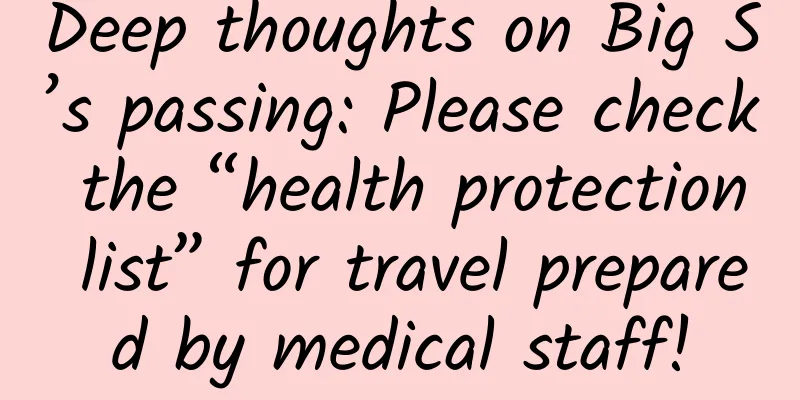Deep thoughts on Big S’s passing: Please check the “health protection list” for travel prepared by medical staff!

|
Recently, a female star died of pneumonia caused by influenza during her trip to Japan, which aroused widespread social concern. We seem to have just realized that life is so fragile and unpredictable, and health is the first factor. Therefore, as someone who is engaged in medical services at the International Medical Department of Xiangya Hospital of Central South University , I and we (doctors and nurses) would like to prepare a "health protection checklist" for you in advance so that you can travel more safely and healthily, especially if you are going abroad or to mountainous areas with harsh natural environments, such as places with great differences in climate and altitude. 1. Preparation before traveling1. Prepare yourself Learn in detail about the epidemic situation in the country or region you plan to visit, your own health assessment, vaccination preparation, etc.; 2. Drug Preparation List of commonly used medicines: common medicines for chronic diseases, cold medicines, emergency medicines, appropriate amounts of sleeping pills, anti-allergic medicines, test strips for local epidemic infectious diseases and corresponding medicines (such as influenza A and B, mycoplasma antigen detection kits, mabaloxavir or oseltamivir); 3. Preparation of supplies Appropriate clothing, comfortable shoes, thermometer, and if necessary: blood pressure monitor, blood glucose meter, portable non-invasive ventilator, etc.; 4. Purchase insurance Medical insurance coverage is recommended to be at least US$100,000 to US$500,000; Insurance companies with a long history and service experience should be preferred. The insurance should cover emergency medical rescue: emergency, hospitalization, surgery and medical transfer to domestic or more advanced hospitals. It is best if they can help with hospital reservations and provide translation support (keep the insurance company's 24-hour global service phone number), etc. 2. Common sudden illnesses and countermeasures1. Food allergy or anaphylaxis Symptoms: rash, itchy skin, chest tightness, shortness of breath, and in severe cases, anaphylactic shock; Countermeasures: For mild allergies, take antihistamines (such as loratadine); If you experience laryngeal edema or difficulty breathing, seek medical attention immediately. Severe cases may require an injection of epinephrine. 2. Diarrhea, vomiting, etc. Symptoms: diarrhea, abdominal pain, nausea, vomiting, or fever; Causes: Accustomed to the local climate and eating raw and cold food: such as sashimi, uncooked seafood, etc., leading to bacterial and viral infections; Countermeasures: In mild cases, montmorillonite powder can be taken to stop diarrhea, and oral antibiotics can be taken if bacterial diarrhea is considered; If you have diarrhea for more than 3 days, high fever, bloody stools, or severe abdominal pain, you should seek medical attention immediately; Preventive measures: Avoid eating raw food and drinking raw water, and try to choose cooked food and reliable water sources. 3. Cardiovascular events (chest pain, palpitations, blood pressure fluctuations) Symptoms : chest tightness, palpitations, dizziness, and severe cases may cause myocardial infarction; Precautions : People with underlying diseases should avoid strenuous exercise and fatigue; those with chronic diseases should take regular medicine on time; patients with hypertension, diabetes, sleep apnea syndrome, coronary heart disease, asthma history, etc. should bring a blood pressure monitor, blood glucose meter, portable non-invasive ventilator, etc., and carry a rescue medicine box with them; Countermeasures: If people with chronic diseases experience severe chest pain, difficulty breathing, or profuse sweating, they should call for help immediately and dial the emergency number. 4. Trauma, sprain, fracture Countermeasures: Mild sprains require immediate cold compresses, followed by heat compresses after 24-48 hours. Elevate the affected limb to reduce swelling; Bleeding wounds can be disinfected with iodine and then bandaged to stop bleeding. If the wound is too deep (or contaminated), seek medical attention immediately to clean the wound, stop bleeding, and determine whether a tetanus shot is needed. When a fracture (dislocation) is suspected or the patient is unable to move, the injured part should be temporarily stabilized and should not be moved at will, especially in the case of spinal injuries. Professionals are required to carry the patient correctly and seek medical attention as soon as possible. 5. Fever and respiratory infections (flu, cold, pneumonia) Symptoms: high fever (>38.5℃), severe cough, sore throat, body aches, extreme fatigue; Countermeasures : For mild symptoms (cold) or fever, take more rest and take Tylenol, ibuprofen or Gankang orally; for positive influenza A and B test or influenza-like symptoms in epidemic areas, take Mabaloxavir or Oseltamivir orally; Avoid bathing if high fever persists; seek medical attention immediately if high fever lasts for more than 3 days without underlying disease, or if high fever, breathing difficulties, or severe chest pain occur with underlying disease. 6. Altitude sickness Symptoms: Headache, shortness of breath, nausea, fatigue, and in severe cases, pulmonary edema or cerebral edema; Countermeasures: Take acetazolamide or high altitude red orally 2-3 days in advance, gradually adapt to the altitude, and avoid drinking and strenuous exercise; Mild symptoms can reduce activity, rest more, drink more water, and breathe oxygen; If you experience severe symptoms (severe headache, confusion, inability to walk), you should immediately descend to a lower altitude and seek medical attention. 3. How to seek help abroad1. Use translation software If you don’t speak the same language, you can use translation software (such as Google Translate, DeepL, etc.) to communicate with local people, or seek help from hotel staff or the Chinese embassy or consulate in the local area; 2. Contact the Chinese embassy or consulate in your country Telephone: Find the emergency contact number of the local embassy or consulate; Website: Visit the official website of the Chinese Ministry of Foreign Affairs or the official website of the Chinese embassy or consulate to obtain contact information; WeChat: Some embassies and consulates provide WeChat services. 3. Call the local emergency number Emergency numbers vary from country to country. Here are some common emergency numbers: United States: 911; Japan: 119 France: 15 (medical care), 17 (police), 18 (firefighting) New Zealand: 111; Australia: 000 Please try to remain calm when calling and explain your location, situation, and the help you need. 4. Give priority to international medical institutions In case of medical emergencies, give priority to large hospitals, emergency centers or internationally recognized private hospitals (such as those in Thailand), which usually have better facilities and multilingual services. 5. Call the insurance company’s 24-hour global service hotline To get financial support and rescue services when needed. Guidance experts: Professor Chen Mingliang, Dermatology Hospital, Xiangya Hospital, Central South University Professor Liu Heli, Department of Gastrointestinal Surgery, Xiangya Hospital, Central South University Professor Liu Hua, Department of Foot and Ankle Surgery, Xiangya Hospital, Central South University Professor Wen Ting from the Department of Orthopedics, Xiangya Hospital, Central South University Professor Peng Jie, Department of Gastroenterology, Xiangya Hospital, Central South University Professor Shi Ruizheng, Department of Cardiology, Xiangya Hospital, Central South University Professor Li Chunhui, Infection Control Center, Xiangya Hospital, Central South University Associate Professor Bai Ning, Department of Thyroid Surgery, Xiangya Hospital, Central South University
(Edited by YT) |
Recommend
What are the items in the pre-marital physical examination for women?
Every couple who is preparing to get married hope...
Why do I have leucorrhea after ovulation?
Many girls will have leucorrhea due to emotional ...
Why do many women have kidney deficiency?
In today's society, one of the characteristic...
What is the reason for lower abdominal pain a few days after ovulation?
In order to have a better chance of getting pregn...
What is the effective way to remove stretch marks after childbirth?
Women will experience a transformation after preg...
How to treat chronic pelvic inflammatory disease
Nowadays, the probability of women suffering from...
Do you have ringworm on your hands? Most of them are caused by scratching
Reviewer: Zhang Shuyuan, Chief Physician, Beijing...
What to do if the vulva is itchy and has fishy leucorrhea
In summer, the weather is hot and the air becomes...
Can I drink Tieguanyin tea during menstruation?
Tieguanyin tea is a kind of tea that many people ...
@Dear citizens, please remember these key points about food safety!
Food is the first necessity of the people, and fo...
[Pulling the hook] and [burping] are really different!
After wolfing down his food and drinking to his h...
Do you know whether to use conditioner or hair mask after washing your hair?
Many women use conditioner when washing their hai...
What are the precautions after taking medicine for abortion?
Currently, many women will take some artificial m...
Can I have medical abortion if I am pregnant at the age of 14?
Abortion brings certain harm to women's bodie...
Effects of taking embryo capsules on women
It is recommended to take Embryo Treasure Capsule...
![[Breast Health] Do you know the symptoms of breast hyperplasia?](/upload/images/67ce1de77f4ee.webp)








